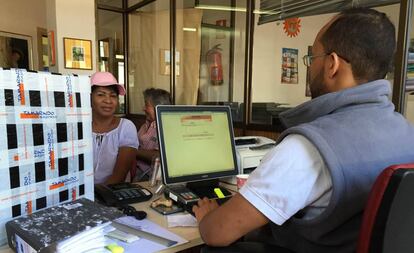“If the package does not arrive, my family does not eat”
Venezuelan immigrants help relatives facing severe shortages at home by sending them food and basic goods from Spain

Businesses that specialize in money delivery and shipping services from Spain to Latin America are thriving as millions of Venezuelans begin to rely on remittances and packages from relatives living abroad in order to face a severe lack of food and medicine caused by the country’s economic crisis.
“We are living through very anxious and stressful times, we are talking about questions of survival,” says Ernesto Reyes, a Tamarindo Express employee. At least five new companies that focus on the Venezuelan community have sprung up this year. “ It is distressing for us because people are not doing well. They are worn down, with horrible stories about lack of security and food,” says Reyes who can barely keep up with the long line of customers.
The upsurge in shipping to make up for a basic goods shortage in Venezuela has boosted small businesses like Tamarindo Express. The company currently handles a ton of packages every week. Venezuelans represent 80 percent of its clientele but, two years ago, they only made up 20 percent of its customer base. According to the National Statistics Institute, there were 7,500 Venezuelans living in Spain in 2013 and the community had grown to nearly 20,000 by 2015.
Supermarkets are empty, you can send all the money in the world but it’s no use because you can’t buy any products
Efraín Cañizares, paralympic athlete
“Those who are suffering the most are the middle class and the poor because right now remittances are the main source of income for all economic sectors in the country,” says Rafael Crespo, a lecturer at the Simón Bolívar University in Caracas who lives in Barcelona. Shipping and money delivery services have had to hire new staff to keep up with demand.
“If the package does not arrive, they don’t eat,” customers say. Tamarindo Express workers still remember the day that a man showed them a picture of his son who had been shot in the leg and explained that “if I do not send him money in two or three hours, they will not see him.” Reyes says he has heard many such “hair-raising stories” this year.
“Supermarkets are empty, you can send all the money in the world but it’s no use because you can’t buy any products,” says Efraín Cañizares, a Paralympic athlete who had just landed in Madrid’s Barajas Airport a few hours before. “The larger the family, the more complicated the situation. How long do you think a kilo of rice will last six or seven people?”
Sign up for our newsletter
EL PAÍS English Edition is launching a weekly newsletter. Sign up today to receive a selection of our best stories in your inbox every Saturday morning. For full details about how to subscribe, click here.
Packages often include diapers, soaps, shampoo, rice, black beans and flour for arepas [corn pancakes]. Shipping costs range from €7-10 per kilo, a rate that is several times higher than the value of the actual package. Many clients send their packages in groups so that they can get discounts on a single large shipment. “We get together with people who come from the same city so it will be cheaper for us,” says Érick Juan, a Venezuelan immigrant who has been living in Madrid for six months. Their main concern is whether the package will actually get to its destination. To assuage these fears, shipping companies partner with local business that agree to receive and deliver the packages to people’s homes.
Shortages have forced Venezuelans to cross the border into Colombia to buy food, medicine and other basic necessities, to seek them out on the black market, or to ask family members abroad for help. “My parent are old, they stayed there and they need medicine,” says Peggy Hernández. Hernández has sent two packages home since she came to Madrid six months ago. “I support them with basic goods and I avoid sending foods that spoil within a week; it’s not economical.”
English version by Dyane Jean François.
Tu suscripción se está usando en otro dispositivo
¿Quieres añadir otro usuario a tu suscripción?
Si continúas leyendo en este dispositivo, no se podrá leer en el otro.
FlechaTu suscripción se está usando en otro dispositivo y solo puedes acceder a EL PAÍS desde un dispositivo a la vez.
Si quieres compartir tu cuenta, cambia tu suscripción a la modalidad Premium, así podrás añadir otro usuario. Cada uno accederá con su propia cuenta de email, lo que os permitirá personalizar vuestra experiencia en EL PAÍS.
¿Tienes una suscripción de empresa? Accede aquí para contratar más cuentas.
En el caso de no saber quién está usando tu cuenta, te recomendamos cambiar tu contraseña aquí.
Si decides continuar compartiendo tu cuenta, este mensaje se mostrará en tu dispositivo y en el de la otra persona que está usando tu cuenta de forma indefinida, afectando a tu experiencia de lectura. Puedes consultar aquí los términos y condiciones de la suscripción digital.








































